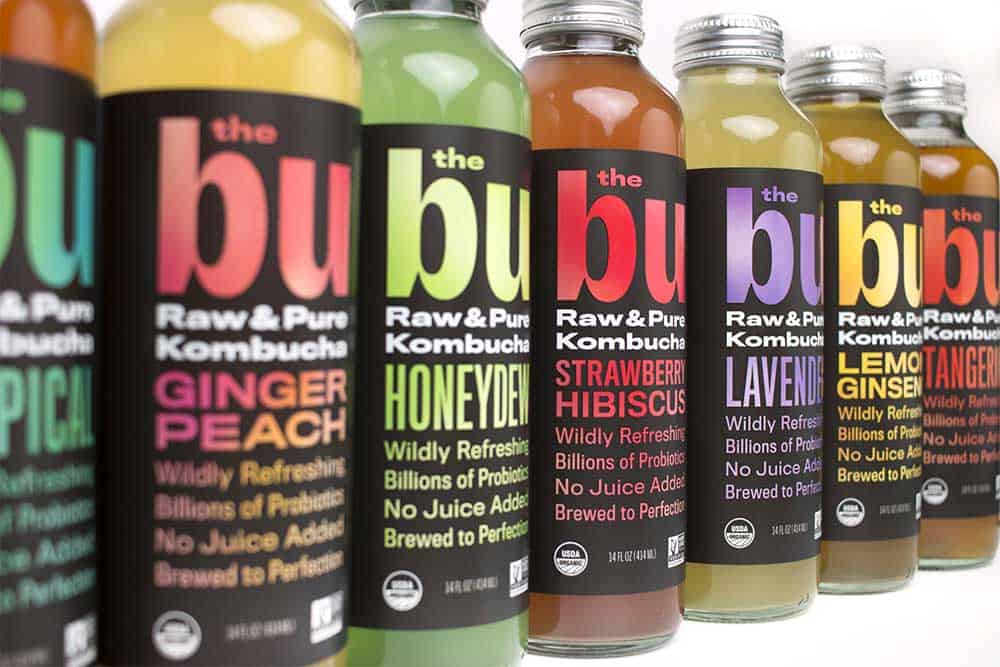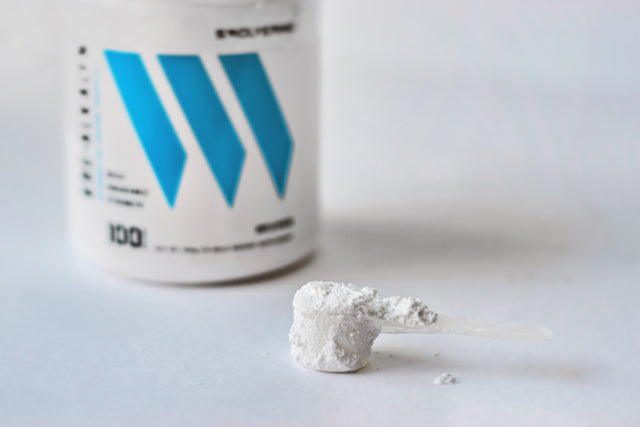I love Kombucha. There’s not a single day that I go without the invigoratingly fizzy deliciousness. Filled with healthy probiotics, Kombucha is not only delicious and refreshing, but it also avowals some impressive health benefits. The most notable is better digestive health, which makes for a happy and healthy belly. So, lets get into the reasons why Kombucha is good for you and why you should add it to your daily diet.
In this article, you’re going to learn
- What Is Kombucha?
- How Is Kombucha Made?
- What Are The Health Benefits Of Kombucha?
- How Much Kombucha Should You Have?
- Should You Be Drinking Kombucha?
What Is Kombucha?
Kombucha is the new wave, when it comes to health and wellness. Chances are you’ve probably seen the beautiful arrays of glass bottles with enticing names like gingerade, honeydew, and lemon ginseng, sprinkled along the end caps at Whole Foods or your local natural foods co-op, as you’re perusing through the beverage isles, demanding your attention.
But, what is Kombucha? Kombucha is an ancient, fermented drink with origins that date back nearly 2,000 years. Kombucha is made with black or green tea and infused with sugar. The sugary mixture results into Kombucha by adding a SCOBY, aka a “symbiotic colony of bacteria and yeast”. Yes! The SCOBY is an actual living colony of healthy bacteria. The result, pure perfection… most of the time. However, not all Kombucha tastes the same. Some can have a stronger culture and taste a bit vinegary when others can be light, refreshing, and bubbly. I would recommend trying a few different brands and flavors, before deciding if Kombucha is right for you. My personal favorites are BU, HUMM, and Upside.
What Are The Health Benefits Of Kombucha? Is Kombucha Good For You?

Kombucha Benefits Digestive Health
The biggest benefit to drinking Kombucha is digestive health. Since Kombucha is fermented and made with bacteria and yeast from the SCOBY, it naturally contains probiotics or healthy bacteria, which may help to strengthen your gut microbiome. Research shows that fermented foods such as Greek Yogurt, Kefir, and Kimchi have been proven to help with overall gut function and digestive health (1)
Having a variety of probiotics within your gut microbiome may improve overall health. Good healthy bacteria found in Kombucha, makes food more digestible through their enzymes, increased vitamin synthesis, and the preservation of nutrients, and also helps to reduce sweet cravings, maintain the immune system, and benefit overall gut wellness (2)
RELATED ARTICLE The Health Benefits Of Probiotics
Kombucha Benefits Brain Health
A growing body of evidence has suggested that there is a link between your gut microbiota and brain function. A study conducted by the University of California Los Angeles (UCLA) and published in the journal Gastroenterology, showed that the brain sends signals to the gut, which is why stress and other various emotions can have an impact upon your gastrointestinal health. (3) Ever noticed that when you’re stressed, or nervous your stomach can get butterflies?
There is an undeniable gut-brain connection and considering that Kombucha contains a host of healthy probiotics, it can certainly provide benefits for potentially helping overall brain function and health.
Most kombucha is also made with green tea, which is one of the healthiest beverages on the planet. Green tea has an impressive nutrient profile and is rich in antioxidants. Green tea also contains a unique amino acid called L-Theanine, which is able to cross the blood-brain barrier. L-Theanine has been shown to increase the activity of the inhibitory neurotransmitter GABA, which has anti-anxiety effects while improving mental alertness and focus (4).
Kombucha Benefits Increased Energy
Since Kombucha is made with green or black tea it can be a great beverage to give you a quick pick me up. Kombucha naturally contains 10-30mg of caffeine per cup and can be a great alternative to your afternoon cold brew. If you’re highly sensitive to caffeine, then sipping on some Kombucha can also be a great way to reduce anxiousness, and give you a long, sustained energy release to help you focus and stay alert. So next time you’re meandering around Whole Foods after you finish your burrito, grab a booch before you head back to work, so you don’t fall asleep at your desk. It’s a great way to get some much needed energy and nourish your gut, turning your nutrients into fuel.
RELATED ARTICLE 6 Caffeine Sources Other Than Coffee To Jumpstart Your Day
Kombucha Benefits Improved Mood
Studies have shown that probiotics can decrease anxiety, diminish perceptions of stress, and improve overall mental outlook (5) Probiotics can increase peripheral tryptophan levels, and alter dopamine and serotonin turnover in the frontal cortex and limbic system (6) Probiotics, also increase omega-3 fatty acid tissue levels, which has been linked to positive mental outlook as well as a reduction in stress (7). Finally, studies have shown that probiotics can influence mood-regulating minerals such as zinc, and magnesium (8).
How Much Kambucha Should You Drink?
Too much of one thing can always be bad. The Cleveland Clinic suggests that drinking four ounces 2-3 times daily is perfectly safe. Personally, I never drink more than two kombuchas in one day.
Can Kids Drinks Kombucha?
The simple answer is yes. With digestive health benefits, as well as being good for brain development and behavior, kids can have kombucha, but it's up to you, on how much.
Is Kombucha Good For You? The Takeaway?
So is Kombucha really that good for you? Yes! In addition to being deliciously bubbly, and smooth, Kombucha has a ton of health benefits that come directly from the trillions of probiotics. Probiotics have a vast impact on your gut health, brain health, and can even improve your overall mood.
Personally, I love Kombucha. But, everyone has a different opinion. Next time your at your local natural grocery store and see some Kombucha on the end cap, give it a try. Remember that not all Kombucha tastes the same. Some brands can be extremely vinegary and taste stronger than others. Try a few different brands and flavors before you ultimately decide, if Kombucha is for you.
Need some more probiotics in your diet? Swolverine's PROBIOTIX contains 6 different strains to help you get the nutrients you need to power your active lifestyle.
SWOLVERINE is an endurance athlete and active lifestyle brand. Made for the elite athlete, and the strong-willed our products were designed to fuel your athletic performance. We perform when you perform.
We believe that everyone can optimize not only their athletic performance but their human potential. The way we believe we can optimize performance is through transparency, clinically effective doses, and clinically proven ingredients with evidence-based outcomes. We provide the nutrients you need to power your active lifestyle.
References
- Bell, V. One Health, Fermented Foods, And Gut Microbiota. Foods 2018.
- Hashemi Z., Fouhse J., Im H.S., Chan C.B., Willing B.P. Dietary pea fiber supplementation improves glycemia and induces changes in the composition of gut microbiota, serum short-chain fatty acid profile and expression of mucins in glucose intolerant rats. Nutrients. 2017
- Champeau, Rachel. “Changing Gut Bacteria through Diet Affects Brain Function, UCLA Study Shows.” UCLA Newsroom, 28 May 2013, newsroom.ucla.edu/releases/changing-gut-bacteria-through-245617.
- Nobre AC, Rao A, Owen GN. L-theanine, a natural constituent in tea, and its effect on mental state. Asia Pac J Clin Nutr. 2008;17 Suppl 1:167-8.
- Bested AC, Logan AC, Selhub EM. Intestinal microbiota, probiotics and mental health: from Metchnikoff to modern advances: part III - convergence toward clinical trials. Gut Pathog. 2013;5(1):4.
- Chen X, D'souza R, Hong ST. The role of gut microbiota in the gut-brain axis: current challenges and perspectives. Protein Cell. 2013;4(6):403-14.
- Mcnamara RK, Strawn JR. Role of Long-Chain Omega-3 Fatty Acids in Psychiatric Practice. PharmaNutrition. 2013;1(2):41-49.
- Pachikian BD, Neyrinck AM, Deldicque L, et al. Changes in intestinal bifidobacteria levels are associated with the inflammatory response in magnesium-deficient mice. J Nutr. 2010;140(3):509-14.
Find similar articles:
Nutrition








